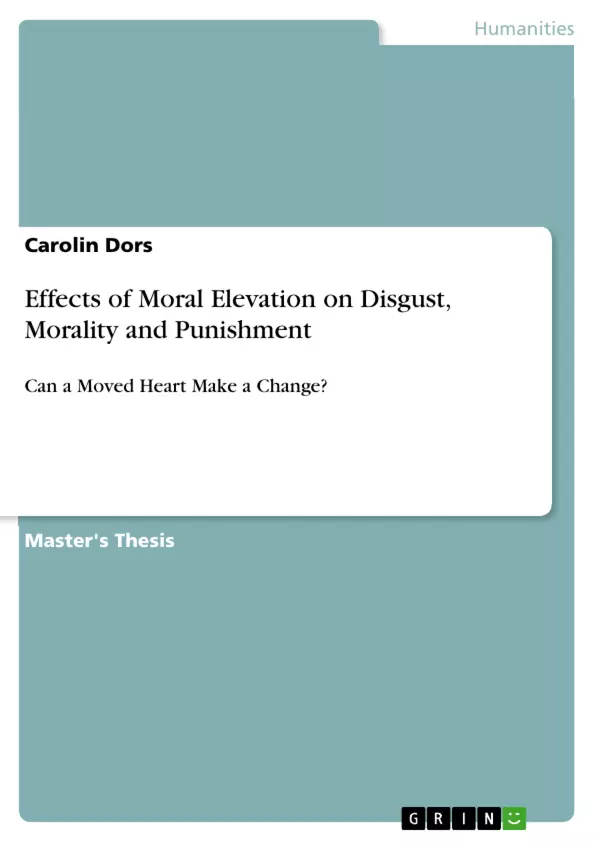Haidt (2003) conceptualizes moral elevation and moral disgust as contrasting emotions at the opposite ends of a “moral purity” dimension. The current paper investigates whether this concept holds true and elevation and disgust are counteracting emotions, e.g., if elevation has diametric effects compared to disgust. As disgust has shown a strengthening effect on morality (Wheatley & Haidt, 2005), the present research examines the influence of elevation on moral judgment and punishment, too. However, evidence in previous research for effects of elevation is contradictory. Thus, in Study 1, we tested in an initial, cross-sectional approach the association of empathy (theorized as “trait elevation”) and disgust sensitivity with pro-social behavior, respectively volunteer work. Empathy was a significant predictor for volunteer work experience. Domains of disgust showed diametric effects: More moral disgust and less pathogen disgust sensitivity were also significant predictors. Study 2 focused primarily on moral elevation as an affective, emotional state and was conducted as a lab-study. We tested three conditions (moral elevation, an amusement condition to control for positive affect, and a neutral condition) on pathogen disgust, moral judgment and punishment motivation. No differences between the conditions were observed. Explanations for the findings are discussed.
Inhaltsverzeichnis (Table of Contents)
- Abstract
- Can a Moved Heart Make a Change? Effects of Moral Elevation on Disgust, Morality and Punishment
- Disgust as Part of a Behavioral Immune System
- Elevation as the Complementary Emotion of Disgust
- Elevation and Pathogen Disgust, Morality and Punishment
- The Present Studies
- Study 1
- Method
- Results
- Discussion
- Study 2
- Method
- Results
- Discussion
- General Discussion
- Strengths, Limitations and Directions for Future Research
- Concluding Remarks
- References
- Tables
- Figure Captions
Zielsetzung und Themenschwerpunkte (Objectives and Key Themes)
This master thesis investigates the relationship between moral elevation and disgust. The main objective is to explore whether these emotions are contrasting concepts at opposite ends of a "moral purity" scale, as theorized by Haidt (2003). The study aims to examine the effects of moral elevation on disgust sensitivity, moral judgment, and punishment motivation.
- The nature of moral elevation and its potential link to disgust.
- The impact of moral elevation on pathogen disgust, moral disgust, and punishment motivation.
- The role of individual differences in empathy and disgust sensitivity in predicting pro-social behavior.
- The potential mediating role of social value orientation in the relationship between moral and pathogen disgust.
- The exploration of cultural differences in moral judgment and punishment motivation.
Zusammenfassung der Kapitel (Chapter Summaries)
The text begins by introducing the concepts of moral elevation and disgust, exploring Haidt’s theory that they occupy opposite ends of a "moral purity" dimension. It discusses the role of disgust as a behavioral immune system, highlighting its evolutionary function in protecting individuals from disease. The text then delves into the nature of moral elevation, highlighting its distinct characteristics and effects on pro-social behavior. It explores the theoretical link between these emotions, outlining potential effects of elevation on pathogen disgust, moral judgment, and punishment motivation.
The text then presents two studies designed to test the null hypothesis concerning the effects of moral elevation. Study 1 examines the association of empathy (considered a trait equivalent of elevation) and disgust sensitivity with pro-social behavior, specifically volunteer work. Study 2 investigates the effects of moral elevation, as an affective state, on pathogen disgust, moral judgment, and punishment motivation.
The studies provide interesting insights into the relationship between moral elevation, disgust, and pro-social behavior. However, the results are not conclusive, and further research is needed to fully understand the complexities of these relationships.
Schlüsselwörter (Keywords)
The core concepts explored in this research are moral elevation, disgust sensitivity, morality, judgment, punishment, and volunteer work. The study examines the interaction between these concepts, exploring the potential influence of moral elevation on disgust, moral judgments, and punishment motivation. The research also considers individual differences in empathy and disgust sensitivity as predictors of pro-social behavior.
Frequently Asked Questions
What is moral elevation?
Moral elevation is an emotional state triggered by witnessing virtuous or exceptionally moral acts. It is often considered the opposite of moral disgust on a "moral purity" scale.
How does disgust affect morality?
Research, such as that by Wheatley & Haidt (2005), suggests that disgust can have a strengthening effect on moral judgments, making them harsher.
What was the goal of the research presented in this paper?
The research aimed to investigate if moral elevation and disgust are counteracting emotions and how elevation influences moral judgment and punishment motivation.
What were the findings of Study 1 regarding empathy?
Study 1 found that empathy (theorized as "trait elevation") was a significant predictor for volunteer work experience among participants.
Did Study 2 confirm the effects of moral elevation on punishment?
In Study 2, no significant differences were observed between the moral elevation, amusement, and neutral conditions regarding pathogen disgust or punishment motivation.
- Citation du texte
- Carolin Dors (Auteur), 2013, Effects of Moral Elevation on Disgust, Morality and Punishment, Munich, GRIN Verlag, https://www.grin.com/document/432871



